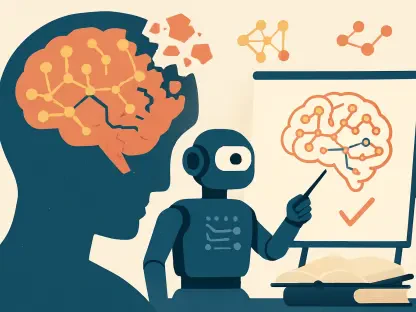In recent years, artificial intelligence has dramatically influenced nearly every industry, and recruitment is no exception. Companies are increasingly leveraging AI to streamline their hiring processes, aiming to enhance efficiency, reduce costs, and optimize talent acquisition. Yet, while AI’s benefits in recruitment are clear, the technology also introduces significant ethical, privacy, and bias-related challenges. Unpacking these multifaceted issues reveals a complex landscape where efficiency often clashes with fairness and privacy. As AI continues to shape the future of work, it necessitates urgent regulatory attention to navigate these challenges.
The Efficiency of AI in Recruitment
Transforming Talent Acquisition
The introduction of AI in recruitment has revolutionized how organizations attract and assess potential candidates. Companies now use AI tools to sift through enormous volumes of applications with speed and precision. These systems deploy advanced algorithms to evaluate resumes against predefined criteria, dramatically reducing the time and effort traditionally spent on initial candidate screening. Employers benefit from quicker hires, lower overheads, and arguably superior matches between job seekers and roles, offering a revolutionary approach to traditional recruitment methods.
However, while these advancements highlight unprecedented efficiency gains, they also raise important questions about the depth and nature of the evaluations these algorithms perform. In many cases, AI systems rank skills, qualifications, and experience with little consideration for the nuances that human recruiters might interpret, such as genuine potential or unique experiences that a resume might not fully convey. Despite these limitations, the transition toward AI-enabled recruitment continues, driven by clear benefits for speed and resource management.
Challenges of Algorithmic Efficiency
Despite the palpable efficiency advantages, a reliance on AI-driven recruitment processes can sometimes be shortsighted. A significant concern is that a purely algorithmic assessment potentially overlooks soft skills and emotional intelligence, which are crucial for many roles. Furthermore, an overdependence on algorithms can lead to missed opportunities by ignoring non-linear career trajectories that may not match rigid criteria set by AI systems. This limitation can deter candidates who might thrive in dynamic and multifaceted positions.
Moreover, some critics argue that AI systems lack the subjective insight necessary to grasp a candidate’s true potential or cultural fit within an organization. While algorithms can filter out applicants, they do not negotiate or understand unique human traits. As AI continues to displace traditional human judgment in recruitment, it highlights the tension between achieving efficiency and preserving the depth and richness of human-led hiring processes. The key challenge lies in integrating AI’s efficiency with nuanced human oversight, ensuring candidates are evaluated fairly beyond mere dataset conformity.
Concerns of Bias and Accountability in AI Recruitment
Uncovering Algorithmic Biases
While AI technology promises to mitigate human biases in hiring, it paradoxically introduces new forms of algorithmic bias. AI systems often learn from historical data, inheriting existing biases present in the datasets they are trained on. These biases can manifest in discriminatory practices, disadvantaging candidates based on race, gender, or socioeconomic background. However, unlike human biases, algorithmic biases are often opaque, concealed within complex systems where inherent prejudices can be inadvertently replicated on a larger scale.
The source of these biases is deeply rooted in historical inequities perpetuated through data. Even well-intentioned systems can replicate societal discrimination if training data is unrepresentative or skewed. Moreover, AI often reinforces existing stereotypes through biased job descriptions, filtering out applicants that do not fit the learned preferences. Acknowledging and addressing these algorithmic biases is essential to foster a fair and inclusive recruitment process, emphasizing the need for diverse and comprehensive training data that counterbalances embedded societal prejudices.
Accountability in AI Decision-Making
The accountability of AI-driven recruitment decisions poses significant challenges for companies and candidates alike. The black-box nature of AI systems means that their decision-making processes are often obscure, with unclear attribution of responsibility when errors or biases occur. This lack of transparency makes it difficult for candidates to challenge or appeal unfair rejections, which can leave them disenfranchised and distrustful of the recruitment process itself.
The issue of accountability extends beyond the AI systems to both employers and system developers. Employers may evade responsibility, attributing adverse hiring decisions to AI outcomes. Likewise, AI developers may deflect blame back to employers who utilize their algorithms without understanding the intricacies or potential biases present. Effective accountability structures necessitate clear regulatory frameworks, delineating responsibilities across stakeholders to ensure ethical decision-making and recourse for affected parties. Central to this is the development of frameworks that allow candidates to understand and contest hiring decisions, fostering greater trust and fairness.
The Implications of AI on Privacy
Data Privacy in Recruitment
AI’s role in recruitment scripts a new chapter in the ongoing story of data privacy. Recruitment systems powered by AI often require processing vast quantities of personal and behavioral data, extending well beyond traditional resume information. This includes web activity, social media presence, and other digital footprints that candidates may not willingly offer. Such comprehensive data collection strategies, while enhancing AI’s ability to draw nuanced insights, often raise alarm about privacy risks and consent.
Central to these concerns is the concept of dignity and reasonable expectations of privacy, which become blurred with AI interventions as data extends into personal and seemingly unrelated areas of a candidate’s life. Companies’ justifications about the legitimacy of data usage hinge on vague standards that may not align with candidates’ expectations. Without stringent challenges and guidance, such practices can lead to the erosion of personal privacy in the pursuit of organizational efficiencies and competitive insights.
Navigating Regulatory Frameworks
The quest for privacy balance in AI recruitment is here and now. Regulations across the globe vary widely in addressing these concerns, yet the momentum of AI adoption surpasses current legislative measures. Regions like Europe have made significant regulatory strides by introducing comprehensive data protection laws such as the General Data Protection Regulation (GDPR) and pioneering frameworks like the AI Act. These laws reinforce transparency and enforce strict consent requirements for data processing, offering a benchmark of robust privacy protection.
However, in other parts of the world, including the United States, the regulatory landscape remains fragmented, with disparate state-level initiatives rather than consistent federal laws governing AI-driven recruiting practices. Consequently, the lack of cohesive regulations presents uncertainties, leaving many organizations to navigate murky territories when determining ethical data use policies. As AI-driven recruitment systems proliferate, a unified regulatory approach is imperative to harmonize privacy standards, ensuring individuals’ rights remain at the fore of technological progression.
Toward Ethical AI Hiring Practices
Building Transparency and Trust
Establishing trust in AI recruitment systems requires transparency. Candidates need assurance that their personal data is being used responsibly and fairly. Organizations must invest in transparent AI systems that elucidate how decisions are made, providing candidates clear visibility into the criteria impacting their candidacy. Additionally, informing candidates on data usage policies, data retention periods, and the scope of algorithmic evaluations contributes to building trust and engagement with AI-driven systems.
The necessity for transparency extends to hiring organizations and their deployment of AI technologies. The dynamic interaction between transparency and trust reveals a cyclical relationship, where enhanced candor about AI processes heightens the legitimacy of recruitment practices. Engaging in open dialogues with candidates, combined with a commitment to regular AI audits, ensures that systems remain accountable, fair, and aligned with both ethical standards and evolving societal expectations.
Guiding Future AI Regulations
As AI continues to dominate the recruitment landscape, foresight in establishing robust ethical guidelines and regulations becomes paramount. Central to future-proofing AI in hiring is the creation of comprehensive frameworks that accommodate rapid technological advancements while safeguarding foundational human rights. Industry leaders, tech developers, and lawmakers must collaboratively craft policies that delineate ethical boundaries, emphasize accountability, and enforce transparency in AI’s application.
The move toward such regulation is anticipated to prioritize inclusivity, ensuring AI recruitment systems cater equitably to diverse demographic segments. Such frameworks would serve as living documents capable of adapting to new challenges, maintaining pace with AI innovations over the forthcoming years. The regulatory approach must balance enabling technological innovation and preventing the erosion of trust that occurs when individuals feel powerless against automated decisions. Embracing proactive and inclusive policies not only promotes more ethical hiring practices but also fosters a revolutionary synergy between technological advancement and social justice.
Embracing an Ethical Recruitment Horizon
In recent years, the influence of artificial intelligence (AI) has become increasingly pervasive across virtually every industry, including recruitment. Businesses are turning to AI to refine their hiring operations in an effort to boost efficiency, curtail expenses, and improve how they acquire talent. The advantages are undeniable, as AI can rapidly sift through résumés, match candidates to job vacancies, and even predict job performance. However, integrating AI into recruitment isn’t without its challenges. There are significant concerns related to ethics, privacy, and unintentional biases ingrained in these technologies. For instance, algorithms might inadvertently favor certain demographic groups over others, given they are often trained on historical data that may contain biases. Furthermore, the use of AI calls into question issues of data privacy, as candidates’ personal information is extensively used to train and refine these systems. As AI continues to mold the employment landscape, a pressing need arises for regulation to manage and mitigate these concerns. Effective oversight is crucial to ensuring that AI advancements do not compromise fairness, transparency, and privacy in hiring practices. Balancing the potential of this technology with the imperative to maintain ethical recruitment processes will be vital as we move forward in this evolving digital era.









